北京大学外国语学院英语系大学英语教研室
北京外国语大学英语学院考研专业介绍、报录比、题型、参考书目、备考
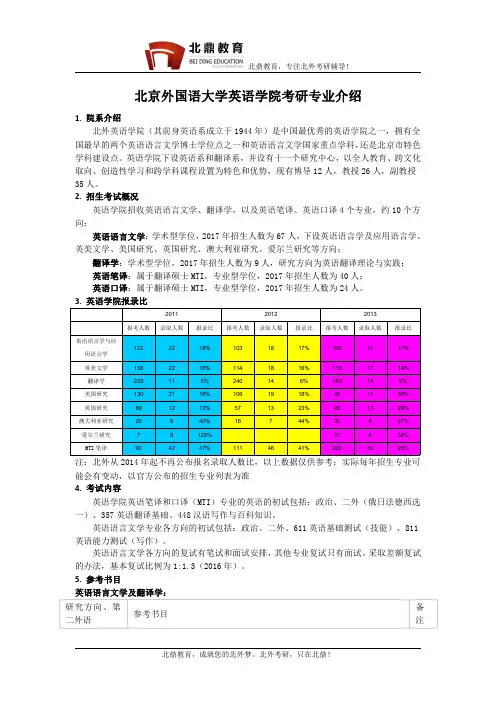
北鼎教育,成就您的北外梦。北外考研,只在北鼎!
北鼎教育,专注北外考研辅导!
研究出版社,2008 年。 3、朱永涛、王立礼主编:《英语国家社会与文化入门》(澳大利亚部 分),北京:高等教育出版社,2005 年。
(06) 爱 尔 兰 研 究
1、梅仁毅主编:《英语国家社会与文化》(爱尔兰部分),外语教学 与研究出版社,2010 年。 2、朱永涛、王立礼主编:《英语国家社会与文化入门》(爱尔兰部分), 高等教育出版社,2000 年。3、王振华、陈志瑞、李靖堃:《列国志: 爱尔兰》,社会科学文献出版社,2012 年(第 2 版)。 4、陈恕主编:《爱尔兰文学名篇选注》,外语教学与研究出版社,2004 年。(准备学习爱尔兰文学子方向的考生可通读此书)
1、M. H. Abrams. The Norton Anthology of English Literature,W. W. Norton,
2002.(重点作家作品)
2、Nina Baym. The Norton Anthology of American Literature,W. W. Norton,
(88)英语笔译 (89)英语口译
翻译写作类 说明:以下书目旨在帮助考生掌握翻译的理念、方法、技巧,考题并不 从书中选取。其中的英文写作类书籍,提供汉译英时应当遵循的语言风 格。 1、Joan Pinkham 、姜桂华著:《中式英语之鉴》,外语教学与研究出 版社,2000 年。 2 、 Joseph M. Williams 著 : Style: Lessons in Clarity and Grace (Eleventh Edition),Pearson 出版社,2014 年;或该书的历史版本:Style: towards Clarity and Grace; Style: Toward Clarity and Grace ; 以 及 Ten Lessons in Clarity and Grace。 3、李长栓著:《非文学翻译理论与实践》(第二版),中国对外翻译出 版公司,2012 年。或同一作者的《非文学翻译》(外研社,2009),《理 解与表达:汉英翻译案例讲评》(外文社,2012),《联合国文件翻译 教程》(中译公司,2014),《理解与表达:英汉口译案例讲评》(外 研社,2013) 或同一作者主编:《实用语篇翻译(英汉双向)》。中国宇航出版社, 2015 年。 4、庄绎传著:《英汉翻译简明教程》,外语教学与研究出版社,2002 年。 5、叶子南著:《高级英汉翻译理论与实践》(第三版),清华大学出版
北京外国语大学英语学院导师介绍:戴宁
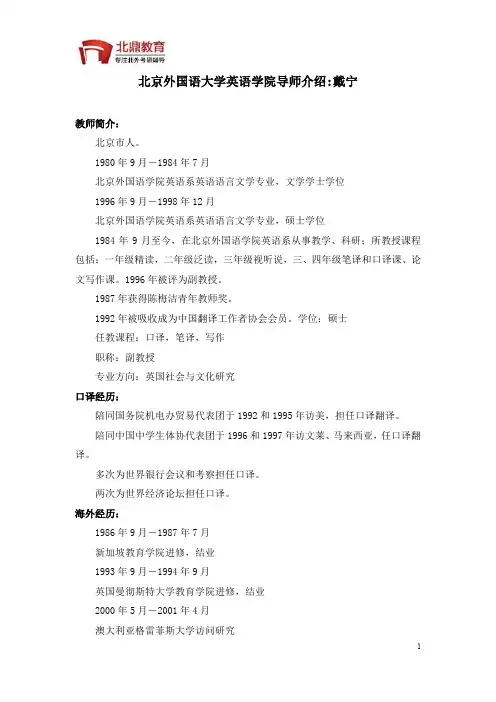
北京外国语大学英语学院导师介绍:戴宁教师简介:北京市人。
1980年9月-1984年7月北京外国语学院英语系英语语言文学专业,文学学士学位1996年9月-1998年12月北京外国语学院英语系英语语言文学专业,硕士学位1984年9月至今,在北京外国语学院英语系从事教学、科研;所教授课程包括:一年级精读,二年级泛读,三年级视听说,三、四年级笔译和口译课、论文写作课。
1996年被评为副教授。
1987年获得陈梅洁青年教师奖。
1992年被吸收成为中国翻译工作者协会会员。
学位:硕士任教课程:口译,笔译,写作职称:副教授专业方向:英国社会与文化研究口译经历:陪同国务院机电办贸易代表团于1992和1995年访美,担任口译翻译。
陪同中国中学生体协代表团于1996和1997年访文莱、马来西亚,任口译翻译。
多次为世界银行会议和考察担任口译。
两次为世界经济论坛担任口译。
海外经历:1986年9月-1987年7月新加坡教育学院进修,结业1993年9月-1994年9月英国曼彻斯特大学教育学院进修,结业2000年5月-2001年4月澳大利亚格雷菲斯大学访问研究研究课题:澳大利亚政治出版物:论文:评价澳大利亚教育产业政策在中国市场的实施从霍华德经济政策看澳大利亚意识形态及政治思想的演化译著:一、文学作品翻译:(以下均为独立完成)1、《沉默的证人》Silent Witness–by Craig Thomas)1998年11月第一版,作家出版社,约47万字2、《禁卫军行动》(Praetorian—by Thomas Gifford) 1994年4月第一版,台湾宏观文化,约35万字3、《危险之财》(A Dangerous Fortune—by Ken Follett)1995年11月第一版,台湾宏观文化,约32万字4、《斗蛇》(Playing with Cobras—by Craig Thomas)1996年6月出版,台湾宏观文化,约30万字5、《疯狂的审判》(A Wild Justice—by Craig Thomas)1996年出版,台湾宏观文化,约34万字6、《扮演上帝的人》(God Player—by Robin Cook) 1986年,北京,华夏出版社出版,13万字二、文史类翻译:《剑桥拉丁美洲史》(第五卷第9-12章及书目评论第6-8节)(The Cambridge History of LATIN AMERICA--Vol.V,c1870—1930 edited by Leslie Bethell) 1992年5月出版,社会科学院文献出版社编著:1、《世界百科全书》世界地理部分38个条目共计6,6万字人民教育出版社2、《最新英汉双解成语词典》(1995年英文版)(P-S)(PP304--394)北京建宏信息工程有限公司参与教材编写:大学听力教材(教师用书)(顾曰国,蒋祖康主编)外研社《实用英汉翻译教程》(与申雨平合编)外研社《现代汉译英口译教程》(吴冰主编)外研社获奖情况:《现代汉译英口译教程》2004年获北京市的教学成果二等奖《危险之财》1996获学校科研奖参与教材编写(文章来源:考研网)。
北京大学英语系本科课程
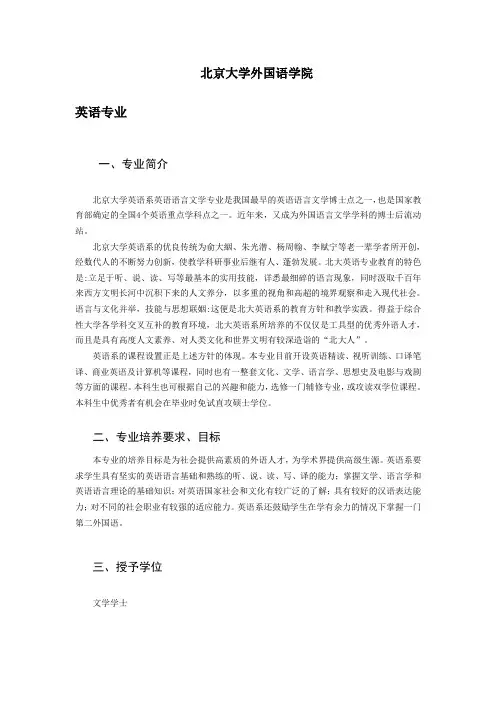
北京大学外国语学院英语专业一、专业简介北京大学英语系英语语言文学专业是我国最早的英语语言文学博士点之一,也是国家教育部确定的全国4个英语重点学科点之一。
近年来,又成为外国语言文学学科的博士后流动站。
北京大学英语系的优良传统为俞大絪、朱光潜、杨周翰、李赋宁等老一辈学者所开创,经数代人的不断努力创新,使教学科研事业后继有人、蓬勃发展。
北大英语专业教育的特色是:立足于听、说、读、写等最基本的实用技能,详悉最细碎的语言现象,同时汲取千百年来西方文明长河中沉积下来的人文养分,以多重的视角和高超的境界观察和走入现代社会。
语言与文化并举,技能与思想联姻:这便是北大英语系的教育方针和教学实践。
得益于综合性大学各学科交叉互补的教育环境,北大英语系所培养的不仅仅是工具型的优秀外语人才,而且是具有高度人文素养、对人类文化和世界文明有较深造诣的“北大人”。
英语系的课程设置正是上述方针的体现。
本专业目前开设英语精读、视听训练、口译笔译、商业英语及计算机等课程,同时也有一整套文化、文学、语言学、思想史及电影与戏剧等方面的课程。
本科生也可根据自己的兴趣和能力,选修一门辅修专业,或攻读双学位课程。
本科生中优秀者有机会在毕业时免试直攻硕士学位。
二、专业培养要求、目标本专业的培养目标是为社会提供高素质的外语人才,为学术界提供高级生源。
英语系要求学生具有坚实的英语语言基础和熟练的听、说、读、写、译的能力;掌握文学、语言学和英语语言理论的基础知识;对英语国家社会和文化有较广泛的了解;具有较好的汉语表达能力;对不同的社会职业有较强的适应能力。
英语系还鼓励学生在学有余力的情况下掌握一门第二外国语。
三、授予学位文学学士四、学分要求与课程设置(2009级及以后适用)总学分:146学分,其中:1.必修课程78学分(公共必修24+大类平台8+专业必修46);2.选修课程 62学分(大类平台8+专业选修42+通选课12);3.毕业论文 6学分;4.其他学习(如科学研究训练、社会实习与实践、校外学习与交流等)。
英语专业博士点
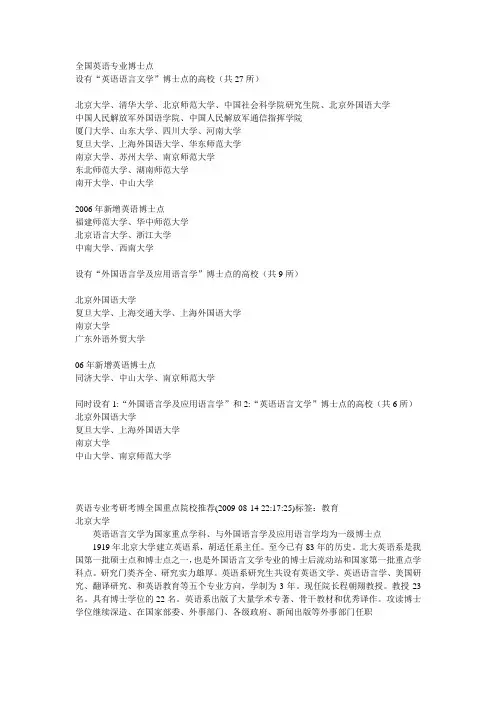
全国英语专业博士点设有“英语语言文学”博士点的高校(共27所)北京大学、清华大学、北京师范大学、中国社会科学院研究生院、北京外国语大学中国人民解放军外国语学院、中国人民解放军通信指挥学院厦门大学、山东大学、四川大学、河南大学复旦大学、上海外国语大学、华东师范大学南京大学、苏州大学、南京师范大学东北师范大学、湖南师范大学南开大学、中山大学2006年新增英语博士点福建师范大学、华中师范大学北京语言大学、浙江大学中南大学、西南大学设有“外国语言学及应用语言学”博士点的高校(共9所)北京外国语大学复旦大学、上海交通大学、上海外国语大学南京大学广东外语外贸大学06年新增英语博士点同济大学、中山大学、南京师范大学同时设有1:“外国语言学及应用语言学”和2:“英语语言文学”博士点的高校(共6所)北京外国语大学复旦大学、上海外国语大学南京大学中山大学、南京师范大学英语专业考研考博全国重点院校推荐(2009-08-14 22:17:25)标签:教育北京大学英语语言文学为国家重点学科、与外国语言学及应用语言学均为一级博士点1919年北京大学建立英语系,胡适任系主任。
至今已有83年的历史。
北大英语系是我国第一批硕士点和博士点之一,也是外国语言文学专业的博士后流动站和国家第一批重点学科点。
研究门类齐全、研究实力雄厚。
英语系研究生共设有英语文学、英语语言学、美国研究、翻译研究、和英语教育等五个专业方向,学制为3年。
现任院长程朝翔教授。
教授23名。
具有博士学位的22名。
英语系出版了大量学术专著、骨干教材和优秀译作。
攻读博士学位继续深造、在国家部委、外事部门、各级政府、新闻出版等外事部门任职北京外国语大学语语言文学为国家重点学科、与外国语言学及应用语言学均为一级学科博士点英语学院成立于2001年,现任院长为孙有中教授。
下设英语系、国际新闻与传播系和翻译系,并设有十个研究中心:英美文学研究中心、语言学研究中心、翻译研究中心、美国研究中心、英国研究中心、澳大利亚研究中心、加拿大研究中心、爱尔兰研究中心、华裔美国文学研究中心、国际传播研究中心。
英语专业大学排名_专业排名
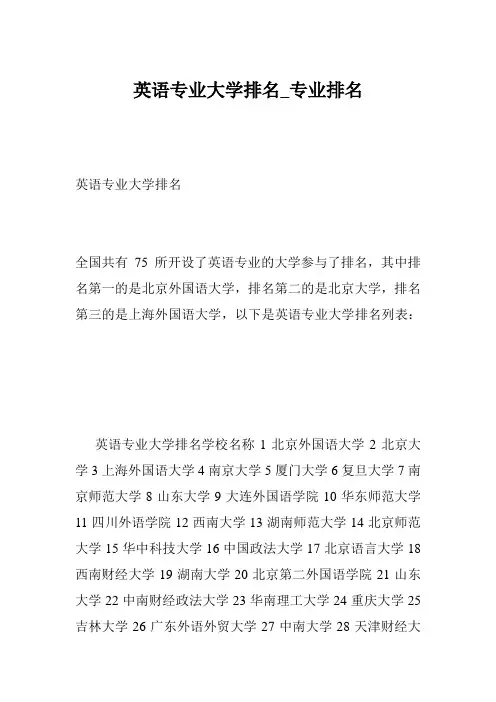
英语专业大学排名_专业排名英语专业大学排名全国共有75所开设了英语专业的大学参与了排名,其中排名第一的是北京外国语大学,排名第二的是北京大学,排名第三的是上海外国语大学,以下是英语专业大学排名列表:英语专业大学排名学校名称1北京外国语大学2北京大学3上海外国语大学4南京大学5厦门大学6复旦大学7南京师范大学8山东大学9大连外国语学院10华东师范大学11四川外语学院12西南大学13湖南师范大学14北京师范大学15华中科技大学16中国政法大学17北京语言大学18西南财经大学19湖南大学20北京第二外国语学院21山东大学22中南财经政法大学23华南理工大学24重庆大学25吉林大学26广东外语外贸大学27中南大学28天津财经大学29东北财经大学30宁波大学31天津大学32武汉理工大学33西南政法大学34大连理工大学盘锦校区35南京航空航天大学36北京邮电大学37中央民族大学38兰州大学39湖南师范大学40山东大学威海分校41西南交通大学42汕头大学43华中农业大学44华中农业大学45中国药科大学46西北工业大学47华侨大学48东北大学49中国民航大学50华北电力大学保定校区51郑州大学52大连海事大学53河海大学54华南农业大学55北京体育大学56大连理工大学57江西财经大学58北京工业大学59中国矿业大学60云南大学61南京农业大学62武汉科技大学63中南民族大学64湖北大学65中南民族大学66广西大学67合肥工业大学68湘潭大学69西北农林科技大学70广州中医药大学71浙江理工大学72南方医科大学73南京邮电大学74海南大学75天津外国语大学以上英语专业大学排名,供大家参考。
英语专业学生主要学习英语语言、文学、历史、政治、经济、外交、社会文化等方面基本理论和基本知识,受到英语听、说、读、写、译等方面的良好的技巧训练,掌握一定的科研方法,具有从事翻译、研究、教学、管理工作的业务水平及较好的素质和较强能力。
北京大学外国语学院英语专业
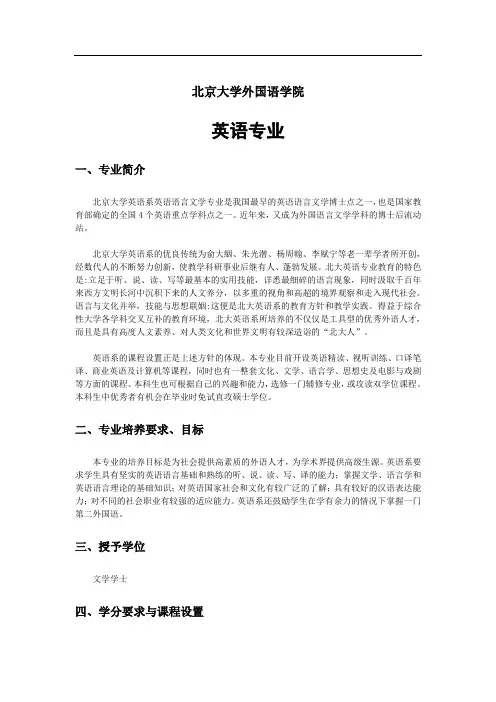
北京大学外国语学院英语专业一、专业简介北京大学英语系英语语言文学专业是我国最早的英语语言文学博士点之一,也是国家教育部确定的全国4个英语重点学科点之一。
近年来,又成为外国语言文学学科的博士后流动站。
北京大学英语系的优良传统为俞大絪、朱光潜、杨周翰、李赋宁等老一辈学者所开创,经数代人的不断努力创新,使教学科研事业后继有人、蓬勃发展。
北大英语专业教育的特色是:立足于听、说、读、写等最基本的实用技能,详悉最细碎的语言现象,同时汲取千百年来西方文明长河中沉积下来的人文养分,以多重的视角和高超的境界观察和走入现代社会。
语言与文化并举,技能与思想联姻:这便是北大英语系的教育方针和教学实践。
得益于综合性大学各学科交叉互补的教育环境,北大英语系所培养的不仅仅是工具型的优秀外语人才,而且是具有高度人文素养、对人类文化和世界文明有较深造诣的“北大人”。
英语系的课程设置正是上述方针的体现。
本专业目前开设英语精读、视听训练、口译笔译、商业英语及计算机等课程,同时也有一整套文化、文学、语言学、思想史及电影与戏剧等方面的课程。
本科生也可根据自己的兴趣和能力,选修一门辅修专业,或攻读双学位课程。
本科生中优秀者有机会在毕业时免试直攻硕士学位。
二、专业培养要求、目标本专业的培养目标是为社会提供高素质的外语人才,为学术界提供高级生源。
英语系要求学生具有坚实的英语语言基础和熟练的听、说、读、写、译的能力;掌握文学、语言学和英语语言理论的基础知识;对英语国家社会和文化有较广泛的了解;具有较好的汉语表达能力;对不同的社会职业有较强的适应能力。
英语系还鼓励学生在学有余力的情况下掌握一门第二外国语。
三、授予学位文学学士四、学分要求与课程设置总学分:146学分,其中:1.必修课程82学分(公共必修24+大类平台8+专业必修50);2.选修课程58学分(大类平台8+专业选修38+通选课12);3.毕业论文6学分;4.其他学习(如科学研究训练、社会实习与实践、校外学习与交流等)。
课程编号:1401025课程名称:英语语音课程英文名称:AnEnglish
课程编号:1401025课程名称:英语语音课程英文名称:An English Pronunciation Course学时/ 学分:32 /2开课学期:第一学期先修课程:适用专业(层次):大学本科英语各专业课程内容:本课程为英语语言文学专业及英语教育专业技能课程中的必修课之一。
本课程旨在向学生系统介绍英语语音和语调的知识。
使学生通过学习和练习了解正确、标准的英语发音,语流的规律,语调的功能,从而能基本上正确使用自然得体的英语语音、语调朗读,表达思想,以达到有效交际的目的。
本课程从44个音素的正确发音开始,逐渐进入英语的音节结构、不同音素组合的发音、单词的强读式和弱读式、英语的句子重音、话语的节奏规律及语调,讲述如何将这些语音知识自然、得体地运用于口语交际及朗读中。
教材及参考书目教材:王桂珍,2000年,《英语语音教程》。
北京:高等教育出版社参考书目:a. English Pronunciation and Intonation Practice王桂珍:高等教育出版社b. 《实用英语语音》葆青:高等教育出版社c.An introduction to English Phonetics周考成:四川大学出版社d. 《英语的音素与发音》王桂珍:中山大学音像出版社课程编号:1401018,1401019,1401020课程名称:英语写作英文名称:English Writing学时/学分:96/6开课学期:第四、五、六学期先修课程:综合英语,英语阅读,英语语法适用专业(层次):四年制英语本科各专业主要内容:《英语写作》是为英语专业本科学生开设的专业必修课,每学期为一个阶段。
该课程的前提是学生已经学完基本语法,掌握5000左右英语词汇,并能较正确而熟练地运用其中的3000左右。
该课程分阶段按选词、遣句、段落和整篇文章写作的顺序进行讲授和训练,最终达到培养学生初步英语写作能力的目的,即能写各种体裁的文章,做到内容充实、语言通顺、用词恰当、表达得体;写作速度达到30分钟300-400个单词;能撰写3,000-5,000个单词的毕业论文,要求思路清晰、内容充实、语言通顺,为学生能较快的适应毕业后实际工作对英文写作的需要,同时为学生英语听、说、读、写、译综合能力的形成做出相应贡献。
2016年北京大学外国语学院硕士研究生入学考试总成绩和拟录取结果
050210 亚非语
78.
7
355 70
90. 30
1.
是
0390255 390255
言文学 54
% 8 %6
10001600 0390369
1116000 390369
田潇
050210 亚非语
78. 35
8
361
70 %
86. 30 7%
1. 8
是
言文学
10001600 1116000 易冠
050210 亚非语
0390237 390237
宁
日语语 言文学
36 1 350 %
8
% 92
是
10001600 1116000 林一 050206 80.
70 90. 30 2.
0390080 390080
鸣
印度语 言文学
62 1 361 %
4
% 96
是
050206
10001600 0390261
1116000 390261
0390108
390108
李媛
言学及 应用语
62
2 387 %
8
%2
是
言学
4
89. 30 3%
0. 75
是
10001600 0390042
1116000 390042
王迪
050201 英语语 言文学
68. 04
6
369
70 %
49. 30 6%
1. 5
否
10001600 1116000 0390444 390444
吴国 彬
050201 英语语 言文学
68. 00
国内英语专业研究生院校排名
深造32%, 国家机关、企事业单位占11%,教育系统45%,出国留学3.2%。
9、中山大学
英语语言文学、外国语言学及应用语言学博士点
中山大学外语学院在1924年孙中山先生创办该大学时设立,1992年正式成立。目前有英语语言文学、外国语言学及应用语言学、日语语言文学、法语语言文学、德语语言文学五个硕士点和英语语言文学博士点,其中我院的英语专业是我国首批具有博士、硕士学位授予权的单位之一,广东省重点学科。 2000年以来,学院共培养了博士毕业生20人;硕士毕业生166人;本科毕业生611人;学院承担了项国家级、省级和校级科研项目37项,出版专著16部、译著64部、工具书6部;编写教材84部;编著著作6部。
拥有博导师 41人、硕导221人,教授113人、副教授177人。其中,国务院学位委员会成员2名,教育部高校外语专业教学指导委员会13名,国家级有突出贡献中青年专家4名,享政府津贴128名。
各部委、各级政府、企事业单位翻译或外事部门、中国驻外机构、涉外出版、传媒的海外部、涉外企业、跨国公司,从事口笔译或与语言文字相关的跨文化交流等
上海外国语大学英语学院系上外历史最悠久、教学规模最大、科研实力最强的学院之一,其英语语言文学学科为国家级重点学科和上海市重点学科。本、硕、博层次分明、专业方向门类齐全,拥有一个博士后流动站、两个博士点(13个博士专业方向)、两个硕士点(8个硕士专业方向)、两个本科专业方向。在校本科生近千名,硕士生600多名,博士生150多名。教学成果多次获得国家级教学成果奖和上海市教学成果奖。英语学院还承担了多项国家和上海市重点科研项目,成果斐然。
现有教师31人,其中教授12名,副教授8名,博士生导师7名,硕士生导师9名,外籍专家10名。
【北大考研辅导班】北大外国语学院考研科目参考书考研分数线拟录取考研经验
【北大考研辅导班】北大外国语学院考研科目参考书考研分数线拟录取考研经验一、北大外国语学院简介-启道北京大学外国语学院于1999年6月由英语语言文学系、东方语言文学系、西方语言文学系、俄语语言文学系四个系组建而成,现下设英语语言文学系、俄罗斯语言文学系、法语语言文学系、德语语言文学系、西班牙语葡萄牙语语言文学系、阿拉伯语言文化系、日本语言文化系、南亚学系、东南亚语言文化系、西亚语言文化系、朝鲜(韩国)语言文化系、亚非语言文学系、外国语言学及应用语言学研究所、世界文学研究所、翻译硕士专业学位教育中心、语言中心,共计12系2所2个中心;拥有英语、俄语、法语、德语、西班牙语、葡萄牙语、日语、阿拉伯语、蒙古语、朝鲜语、越南语、泰国语、缅甸语、印尼语、菲律宾语、印地语、梵巴语、乌尔都语、波斯语、希伯来语等20个本科语种专业。
与元培学院、历史系共建有外国语言与外国历史专业;与元培学院、考古文博学院联合开设外国语言与外国历史专业-外国考古方向。
除招生语种外,学院还拥有拉丁语、马来语、孟加拉语、中古波斯语(巴列维语)、阿卡德语、苏美尔语、赫梯语、阿拉米语、藏语等现代和古代语言的教学资源并开设过课程;学院有教师从事古冰岛语、古叙利亚语、圣经希伯莱语、吐火罗语、格鲁吉亚语、于阗语等语言的研究,其中古冰岛语和格鲁吉亚语计划近期开设课程。
学院开课语言和研究语言的数量正在稳步增加。
学院共有1个一级学科博士点,11个二级学科博士点,1个博士后流动站。
学院的英语语言文学专业和印度语言文学专业是国家重点学科;亚非语言文学专业是国家重点培育学科。
学院拥有教育部人文社科研究基地“东方文学研究中心”和“国家外语非通用语种本科人才培养基地”,以及阿拉伯语、西班牙语、南亚语种群、东西亚语种群等4个高等学校特色专业。
在学院所属的12系2所2个中心,除外国语言学及应用语言学研究所、世界文学研究所只招收硕士和博士研究生、翻译硕士专业学位教育中心只招收专业学位硕士研究生外,其他各系均招收本科、硕士、博士等各个层次的学生。
- 1、下载文档前请自行甄别文档内容的完整性,平台不提供额外的编辑、内容补充、找答案等附加服务。
- 2、"仅部分预览"的文档,不可在线预览部分如存在完整性等问题,可反馈申请退款(可完整预览的文档不适用该条件!)。
- 3、如文档侵犯您的权益,请联系客服反馈,我们会尽快为您处理(人工客服工作时间:9:00-18:30)。
北京大学外国语学院英语系大学英语教研室“高级英语—阅读与写作”期中考试2002年11月姓名________________ 学号________________系别________________ Reading TaskDirections: Read the follow ing article, and pay special attention to the words underlined. You w ill be asked to explain them after reading.What Every Y ale Freshman Should KnowEdmund S. MorganThe world does not much like curiosity. The world says that curiosity killed the cat. The world dismisses curiosity by calling it idle, or mere idle, curiosity—even though curious person are seldom idle. Parents do their best to extinguish curiosity in their children, because it makes life difficult to be faced every day with a string of unanswerable questions about what makes fire hot or why grass grows, or to have to halt junior’s investigations before they end in explosion and sudden death. Children whose curiosity survives parental discipline and who manage to grow up before they blow up are invited to join the Yale faculty. Within the university they go on asking their questions and trying to find the answers. In the eyes of a scholar, that is mainly what a university is for. It is a place where the world’s hostility to curiosity can be defied.Some of the questions that scholars ask seem to the world to be scarcely worth asking, let alone answering. They ask about the behavior of protons, the dating of a Roman coin, the structure of a poem. They ask questions too minute and specialized for you and me to understand without years of explanation.If the world inquires of one of them why he wants to know the answer to a particular question, he may say, especially if he is a scientist, that the answer will in some obscure way make possible a new machine or weapon or gadget. He talks that way because he knows that the world understands and respects utility and that it does not understand much else. But to his colleagues and to you he will probably not speak that language. You are now part of the university, and he will expect you to understand that he wants to know the answer simply because he does not know it, the way a mountain climber wants to climb a mountain simply because it is there.Similarly a historian, when asked by outsiders why he studies history, may come out with a line of talk that he has learned to repeat on such occasion, something about knowledge of the past making it possible to understand the present and mold the future. I am sure you have all heard it at one time or another. But if you really want to know why a historian studies the past, the answer is much simpler: he wants to know about it because it is there. Something happened, and he would like to know what.All this does not mean that the answers which scholars find to their questions haveno consequences. They may have enormous consequences; they may completely alter the character of human life. But the consequences seldom form the reason for asking the questions or pursuing the answers. It is true that scholars can be put to work answering questions for the sake of the consequences, as thousands are working now, for example, in search of a cure for cancer. But this is not the primary function of the scholar. For the scholar the consequences are usually incidental to the satisfaction of curiosity. Even for the medical scholar, the desire to stamp out a dreaded disease may be a less powerful motive than the desire to find out about the nature of living matter. Similarly Einstein did not wish to create an atomic bomb or to harness atomic energy. He simply wanted to find out about energy and matter.I said that curiosity was a dangerous quality. It is dangerous not only because of incidental effects like the atomic bomb but also because it is really nothing more or less than a desire for truth. For some reason this phrase sounds less dangerous than curiosity. In fact, the desire for truth sounds rather respectable. Since so many respectable people assure us that they have found the truth, it does not sound like a dangerous thing to look for. But it is. The search for it has again and again overturned institutions and beliefs of long standing, in science, in religion, and in politics. It is easy enough to see today that these past revolutions brought great benefits to mankind. It was less easy to see the benefits while the revolutions were taking place, especially when you happened to be quite satisfied with the way things were before. Similarly it is not always easy today to see that the satisfaction of a scholar’s curiosity is worth the disruption of society that may result from it. The search for truth is, and always has been, a sub versive activity. And scholars have learned that they cannot engage in it without an occasional fight.You may therefore find them rather belligerent toward any threat to the free pursuit of curiosity. They are wary of committing themselves to institutions or beliefs that might impose limitations on them or deliver ready-made answers to their questions. You will find them suspicious of loyalty oaths, religious creeds, or affiliations with political parties. In particular they will try to preserve their university as a sanctuary within those walls any question can be asked.This wariness of commitment can sometimes degenerate into a scholarly vice, a vice that paralyzes curiosity instead of preserving it. A scholar at his worst sometimes seems to be simply a man who cannot make up his mind. Every classroom from here to Melbourne has echoed with the feeble phrases of academic indecision: “There are two schools of thought on this question, and the truth probably lies halfway between them.” When you hear this sentence repeated, or when you are tempted to repeat it yourself, remember that the truth may lie between two extremes, but it assuredly does not lie halfway between right and wrong. Don’t short-circuit your curiosity by assuming you have found the answer when you have only made a tidy list of possible answers.Dedication to curiosity should not end in indecision. It should, in fact, mean willingness to follow the mind into difficult decision.A second quality that makes a scholar has no apparent relation to the first and yet is inseparably connected to it. It is a compulsion to communicate. A scholar is driven by a force as strong as his curiosity, that compels him to tell the world the things he has learned.He cannot rest with learning something: he has to tell about it. Scholarship begins in curiosity, but it ends in communication. And though scholar may in a university take refuge from the world, they also acknowledge responsibility to communicate freely and fully everything that they discover within the walls of their sanctuary. The search for truth needs no justification, and when a man thinks he has found any part of it, he cannot and ought not to be silent. The world may sometimes not care to listen, but the scholar must keep telling it until he has succeeded in communicating.Now there are only two methods of communication for scholars, writing and speaking. The scholar published his discoveries in books and articles and he teaches them in the classroom. Sometimes one or the other method will satisfy him, but most of us feel the need for both. The scholar who merely writes books falls into the habit of speaking only to the experts. If he works at his subject long enough, he reaches the position where there is no one else quite expert enough to understand him, and he winds up writing to himself. On the other hand, if he writes not at all, he may become so enamored of his own voice that he ceases to be a scholar and becomes a mere showman.Communication is not merely the desire and the responsibility of the scholar; it is his discipline, the proving ground where he tests his findings against criticism. Without communication his pursuit of truth withers into eccentricity. He necessarily spends much of his time alone, in the library or the laboratory, looking for the answer to his questions. But he needs to be rubbing constantly against other minds. He needs to be tested, probed, and pushed around. He needs to be made to explain himself. Only when he has expressed himself, only when he has communicated his thoughts, can he be sure that he is thinking clearly.The scholar, in other words, needs company to keep him making sense. And in particular he needs the company of fresh minds, to whom he must explain things from the beginning. He needs people who will challenge him at every step, who will take nothing for granted. He needs, in short, you.You may have various purposes in coming here, and you may fulfill them: you may play football or tennis or the trombone; you may sing in the glee club, act in plays, and act up on college weekends. But what the faculty expects of you is four years of scholarship, and they will be satisfied with nothing less. For four years we expect you to join us in the pursuit of truth, and we will demand of you the same things we demand of ourselves: curiosity and communication.Curiosity, of course, is not something you get simply by wishing for it. But it is surprisingly contagious. The curiosity we expect is more than a passing interest. We will not be satisfied by your ability to ask an occasional bright question, nor yet by your assimilation of a lot of predigested information. The accumulation of information is a necessary part of scholarship, and unfortunately the part most likely to be tested on examinations, especially those wr etched ones called “objective examinations” where the truth is always supposed to lie in answer space A, B, C, D, or E, but never apparently in X, Y, or Z. But the curiosity we expect of you cannot be satisfied by passing examinations or by memorizing othe r people’s answers to other people’s questions. We do not wish to put you through a mere course of mental gymnastics. We want you to be content with nothing less than the whole truth about the subject that interests you. Which means that we wantyou to be forever discontent with how little you know about it and how little we know about it. We want you to back us into corners, show us up, and make us confess we don’t know. Does this sound formidable? It is not. We may tell you what we know with great assuran ce, but push us and you will find the gaps.Follow your own minds into the gaps. Follow your minds where curiosity takes them. You will not get the whole truth, not about protons, not about the structure of a poem, not even about a Roman coin. Nobody does. But if you learn anything, it ought to change your minds, and hopefully it will change ours too. It will be a sign that we have both wasted four years if you leave here thinking pretty much the same way that you do now or if you leave us thinking the same way we do now.We expect of you, then, that you will be curious for the truth. We also expect that you communicate whatever truth you find, and that you do it both in speech and writing. Many people suppose that they know something if they can stammer out an approximation of what they mean in speech. They are mistaken. It is extremely unlikely that you have thought clearly if you cannot express yourself clearly, especially in writing. Writing is more than an instrument of communication. It is an instrument of thought. You should have acquired some competence in its use by now. I suspect from past experience that you have not. But even if you have, you have a great deal more to learn about it. And if you do not know much more about it four years from now, It will again be a sign that we have failed in part of our job, the job of making you communicate clearly.Communication is a two-way process, and a university is a community of scholars, where questions are asked and the answers communicated, your answers to us, ours to you. For the next four years we will be engaged as scholars together in this community. After the four years are over, most of you will leave Yale, but if our community is a successful one, if we really do communication with each other, I believe that you will continue to be in some sense scholars, asking new questions, looking for new answers, and communicating them to the world.I. Context (10%)Read the text carefully and try to explain the meanings of the underlined words or expressions in English.1. faculty __________________________________________________________________2. behavior _________________________________________________________________3. a line of talk ______________________________________________________________4. incidental_________________________________________________________________5. of long standing ___________________________________________________________6. short-circuit ______________________________________________________________7. winds up ________________________________________________________________8. the proving ground________________________________________________________9. rubbing constantly against other minds ________________________________________10. show us up _____________________________________________________________II.Multiple-Choice Questions (10%)Directions: Make your choice according to the text and write the corresponding letter in the brackets.1. ( );2. ( );3. ( );4. ( );5. ( )1.The first half of the essay is primarily written in the form of ________.A.definitionB.classificationC.exemplification2.The second quality “communication” is stated as __________.A.an inevitable consequence of curiosityB.something as important as curiosityC. a strong force for scientific research3.The world rejects curiosity for the following reasons except that __________.A.curiosity causes lazinessB.curiosity makes life more difficultC.curiosity kills the young4.Why should scholars preserve a university as a sanctuary?A.Because university is the place where they can pursue truth freely.B.Because university is the place where they can get the answers they need.C.Because university is the place where they can keep their minds undiluted.5.Which of the following is not true according to the text?A.It is the scholar’s responsibility to make known his discoveries to the society.munication is a way to test the scholar’s discoveries.C.The scholar needs company to get his answers.III.Writing Task (10%)Directions: Summarize the main argument s of “What Every Yale Freshman Should Know”(about 100 words). Then write a brief response to show your understanding of it. (200 words)Summary:___________________________________________________________________________ _______________________________________________________________________________ _______________________________________________________________________________ ________________________________________________________Response:_________________________________________________________________ _____________________________________________________________________ _____________________________________________________________________ _____________________________________________________________________ _____________________________________________________________________ _____________________________________________________________________ _______________________________________________。
